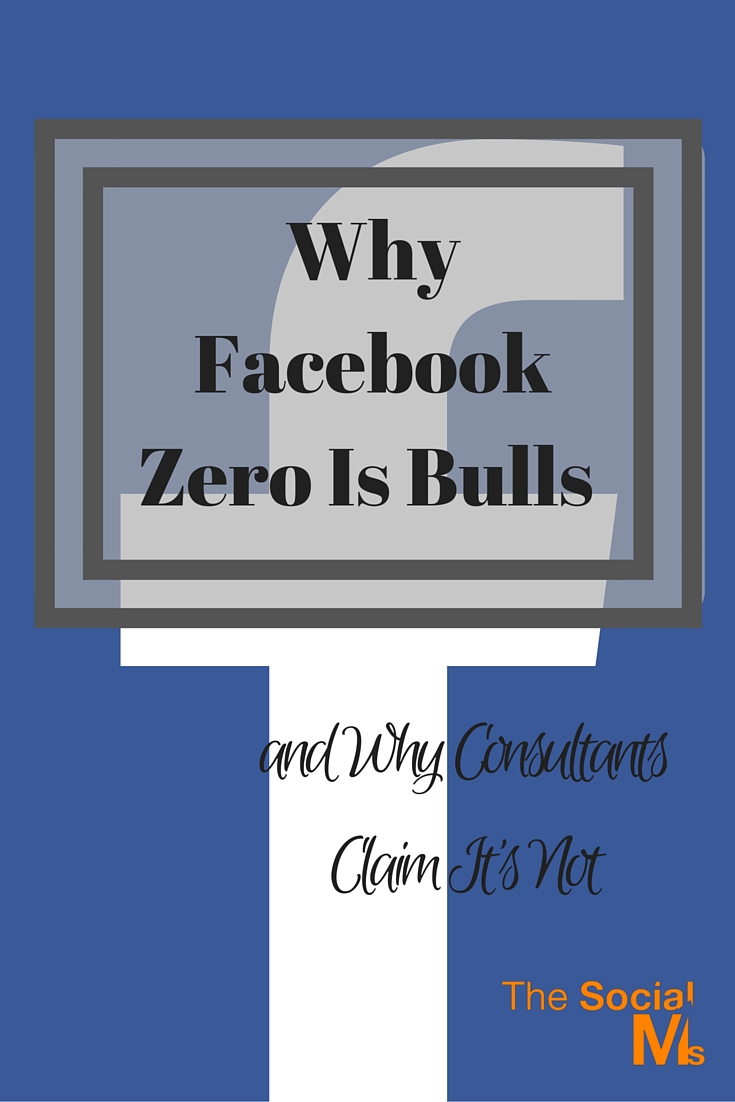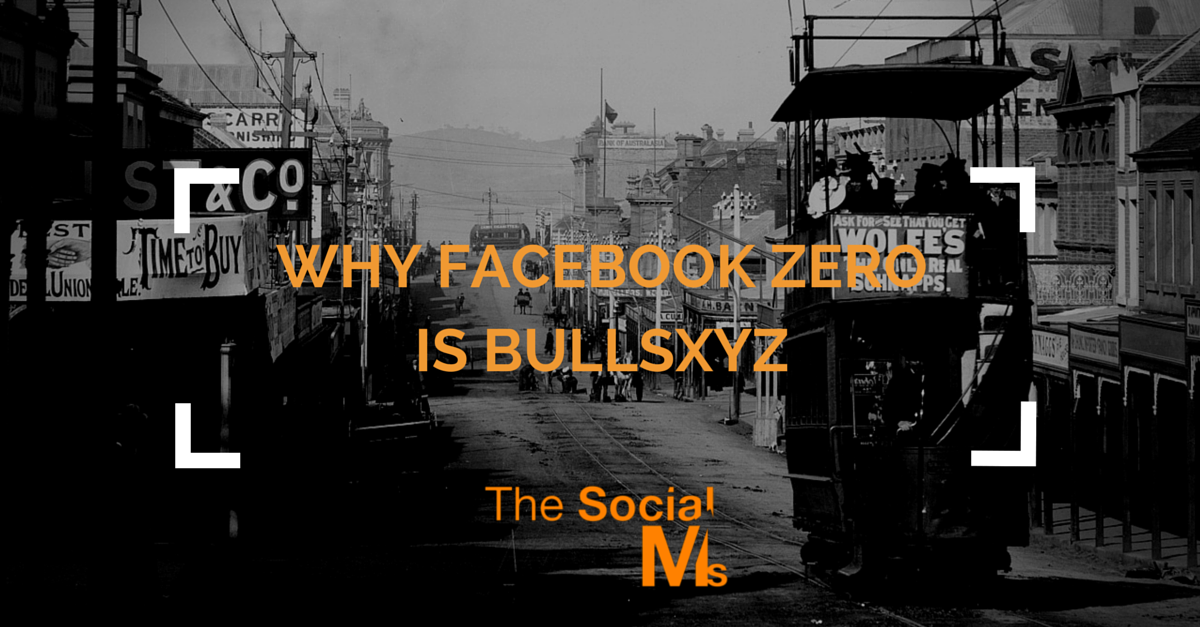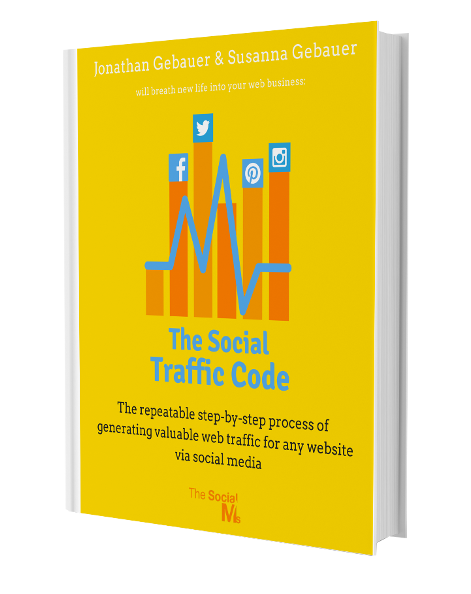Warning, the following article is a bit of a rant…Nothing to start the week better than with a rant.
Facebook recently launched another update – and it didn’t take long until articles began to appear that claimed that it is the next step to “Facebook Zero.”
In case you didn’t know, Facebook Zero is the term coined by marketers describing the point sometime in the future when Facebook Fanpages will have zero organic reach. A condition which will according to them be reached because Facebook is drifting more and more towards a pay-to-play marketing platform that doesn’t show posts by Fanpages to fans unless the Fanpage admin pays for the distribution.
Before you read on - we have various resources that show you exactly how to use social networks to gain massive traffic and leads. For instance, check out the following:
FREE Step-by-Step Twitter Marketing GuideFREE Pinterest Marketing Ebook
Which really is Bulls… What these marketers are really doing is driving clicks and traffic – ironically probably a lot of them through Facebook. Have a look:
This screenshot was taken today – from this article, which was published on Social Media Today on April 29. Let’s have a close look at this article.
It was written by Andrew Hutchinson, an “award-winning” writer and blogger – whom I’ve never heard of. His Bio on SMT says writer/consultant – and I believe that. He also is from Australia – which is something I hold in his favor as many of my favorite bloggers are from Australia. And while reading his article, believe it or now, I could hear him thinking… enlightening my thoughts while I read… Ok, maybe not enlightening me on the Facebook update – but enlightening on how best to drive traffic to your article.
Let me describe what I heard when reading the article.
Andrew’s thoughts: Yiehaa another Facebook Newsfeed article to cash in on… For the start, we need some drama.
Article: “Earlier this week, Facebook updated their News Feed algorithm again, in what many are seeing as the next move towards ‘Facebook Zero’ – i.e. 0% organic reach for pages.”
Andrew’s thoughts: That should be enough for setting the stage. Mentioned Facebook, check. Mentioned organic reach, check. Mentioned update, check. Traffic can come… bugger, I still need to write the rest of the article. Ok, wait – see what we have. Easy thing to write – you can copy half the text from Facebook’s press realease – life is easy. Oh bugger – the first update doesn’t really have anything to do with what I’m talking about… if anything at all then it will increase organic reach for brands – what do I do now? Ok, I will declare that as “nothing major – impacts should be minimal.”
Article: “Previously, the algorithm ensured people were not shown multiple posts from the same source in a row – they’ve opted to relax this measure for people who run out of content to view and are seeking more. Nothing major there, the impacts should be minimal.”
Hey, before you read on - we have in various FREE in-depth guides on similar topics that you can download. For this post, check out:
FREE workbook: CREATE AWESOME BLOG POSTS
FREE Beginner's Guide: START A BLOG
Andrew’s thoughts when he continues writing: Thank god, I have something I can use in the second part of the update…
Here is what Facebook says about the second update: “…tries to ensure that content posted directly by the friends you care about, such as photos, videos, status updates or links, will be higher up in News Feed so you are less likely to miss it. If you like to read news or interact with posts from pages you care about, you will still see that content in News Feed. This update tries to make the balance of content the right one for each individual person.”
Here is what Andrew makes of this:
“So the focus of this one is on friends who you regularly interact with, on showing you more content from those users and ensuring their posts appear more prominently in your feeds….”
Sorry Andrew, but you got that all wrong – that is not what Facebook wrote about this part of the update. This part tries to ensure that content “by the friends you care about” is placed higher in the feed. If you reread this sentence carefully, you’ll notice that this doesn’t mean that the update just sorts the updates of friends and family on top and the fanpages on the bottom of the stream. This part of the update reorganizes the content by the “friends you care about” on top of the ones that you don’t care about.
Do you want to know how to build a social audience and generate reliable Social Media Traffic?! Get our ebook “The Social Traffic Code!”
Facebook explicitly claims that this doesn’t affect the content by pages: “If you like to read news or interact with posts from pages you care about, you will still see that content in the news feed.” Translation: Pages won’t be affected or at least not by much. At the very least the effect on pages is very unclear from today’s perspective and needs to be examined in the future.
Ok, I will stop this charade now – no, I cannot hear Andrew thinking. I just wish he would have provided a better analysis instead of traffic-baiting content. Because he continues his misinterpretation of Facebook’s statement when he is talking about the third part of the update. First, here is Facebook’s original statement:
“So the focus of this one is on friends who you regularly interact with, on showing you more content from those users and ensuring their posts appear more prominently in your feeds.”
And here is Andrew’s direct conclusion:
“Again, the precise impact of this change is hard to predict, but it underlines the fact that ‘likes’, in themselves, are becoming little more than an aesthetic measure – and worse, that even interactions like comments aren’t necessarily going to increase your post reach. This change inadvertently puts more emphasis on shares and on prompting users to take direct action to explicitly promote their support of your page.”
Sounds quite logical, doesn’t it?
Well, it shouldn’t. Interactions, like pressing the like button or commenting, are primarily interactions with the original poster. The message that a friend of mine pressed like on a post on Andrew’s page doesn’t mean that much to me. My friend says that he likes that post. But just because he likes that doesn’t necessarily mean that he wants to tell me that he likes it or that I even want to know. These interactions are far less meant for spreading content than Andrew assumes: That is what the Share Button is for.
Once my friend presses the share button on that same post – that means he wants to share the stuff with his friends. And that is where true reach is coming from.
But let’s continue in the article – because Andrew now begins to demonstrate amazing knowledge of marketing on Facebook – really, I’m impressed! Here it is:
“So what’s that mean for Facebook marketing? This change further underlines the need for brands to move from a broadcast focus to making themselves part of the conversation.”
And slightly further down:
“…but the principle for Facebook marketing remains that you need to create great content, you need to listen to what your audience wants and is responding to, and you need to become part of those conversations in order to attract more direct interactions with individuals and ensure your brand is part of any relevant conversations.”
Yiehaa. Here we have it: You need to make yourself part of the conversation. You need great content.
Big news: That was always the principle of (well done) social media marketing. And if Andrew has been telling his clients to use Facebook as a broadcast channel before – I wouldn’t want to be his client.
Ok, there is slightly more content in the article – the author obviously wanted to impress with his knowledge. But he never manages to pass the level of simple name-dropping and elevate his content to the point where it becomes really interesting. Mentioned “Employee Advocacy”… check. Mentioned “search functionality” and “API restrictions”… check.
The thing is, Andrew is a lot more clever than I give him credit for: He is not writing a profound and helpful content piece, he is cashing in. Not on money, but on clicks. Whenever Facebook releases an update, these types of posts get published. And they always seem to do the trick. And as I haven’t mentioned it before – putting a catchy title on top of the piece is part of the deal. Andrew opted for: Facebook’s Latest News Feed Update: Time to Move On?
Learn how to grow a social audience and traffic from social media with our ebook “The Social Traffic Code!”
I’m not the first social media marketer who is getting annoyed, and I don’t believe I will be the last. Jon Loomer, arguably the world’s most well known and advanced Facebook marketer wrote an interesting piece on this problem here. He also makes the very relevant point that the obsession with organic reach by Facebook marketers is wrong. Organic reach itself is a false metric. Facebook focuses on giving each user the newsfeed they want. And not every fan of yours wants to see (all) your updates. Some of your fans may have become fans years ago, but have since moved on. Some of your fans may simply like you as a person, but may also be annoyed by your content. Face it. Deal with it.
Sidenote: Maybe part of the problem is that Facebook used the terminology “Fans” and “Fanpages” – if they had used “Mildly interested person” nobody would ever complain.
Much more relevant questions around defining whether you successfully reach an audience are:
- Are you engaging your audience?
- Are they commenting, liking your posts?
- Are they clicking on your links?
- Are the numbers above growing or declining?
- Are you part of the conversation?
- …
One problem with many marketers is that they define themselves through easily accessible metrics: I’ve got more Twitter Followers than others, Facebook Fans, etc. Organic Reach on Facebook fits this perfectly – this is what they are telling their clients to look at. And if this number is going down they say “Oh that’s not our fault – Facebook updated its algorithm.” While totally forgetting that what they were doing was annoying the audience which led to Facebook making changes so they wouldn’t be able to annoy them anymore.
Another problem here is that many marketers seem to believe somehow that Facebook “owes” us something. It doesn’t, but Facebook owes its users a great UX, and that’s it. If we can market on Facebook without destroying that, then Facebook is fine with that – if we are disturbing the UX for Facebook’s users, Facebook will adapt its system until we can’t do that anymore. Facebook’s capital are its users, not the marketers.
I remember when the Facebook Fraud video came out, and everyone was all over it. While the video made some relevant points, it was tremendously flawed by not examining ways around the problems. The truth is that many marketers have tremendous success on the Facebook advertising platform – and there are many ways around the problems that are pointed out in the video. But once the marketing crowd has found a scapegoat, they will continue beating the same dead horse for as long as they can.
Just a couple of weeks ago I was in a discussion with a client. They had seen the Facebook Fraud video – and were very unsupporting of trying Facebook ads. The problem: For their specific situation these would have provided tremendous value. But I wasn’t able to convince them.
Well, I see the same thing coming for using Facebook as a marketing platform at all:
Andrew’s closing paragraph starts with the following sentence:
Whatever the outcome, it’s clear that this update doesn’t help Facebook marketers and further supports the looming dawn of Facebook Zero.
“Whatever the outcome…” Really? So if I with the limited knowledge of the English language (I’m German after all) understand this sentence correctly, it comes down to: Even if organic reach for pages goes up by 200% after this update, it is still clear that this update is bullcrap for marketers. For me, it is pretty clear that Andrew didn’t put much thought into this topic. He just wanted a piece of the traffic.
It’s not hard for me to imagine Andrew being in a meeting with a client one day – and trying to convince him to improve their Facebook efforts. What will he answer when the client says: “But everybody knows that it’s time to move on from Facebook!”



